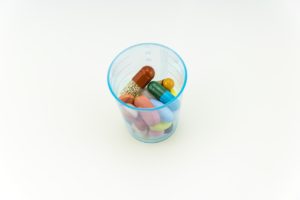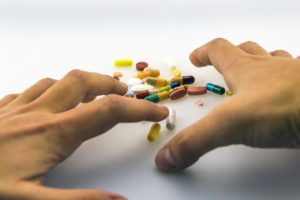You already know that nutrition is the backbone of a healthy person; we’ve been told to eat good food since we were children. Vegetables, whole grains, fruits, these things are all good for us, right?
That’s where the knowledge about diet and nutrition stops for most people, though. Some people learn more – they learn how to adjust their diet to peak their specific health for their age, or aim to gain more muscle and lose fat. Not a lot of people know that good nutrition can actually be used to prevent damage done by drug use.
How does nutrition affect drug use?
Drugs are actually quite similar to minerals and vitamins: they are chemical compounds that affect the body in certain ways. Granted, vitamins and minerals are healthier than illicit drugs, but knowing this can make it easier to understand how drugs can be affected by nutrition.
 For example, drugs are metabolized by the body just like vitamins and minerals are. This means that the drugs, just like a vitamin would be, is broken down by your body and either turned into other compounds, which have further impacts on the body, or excreted.
For example, drugs are metabolized by the body just like vitamins and minerals are. This means that the drugs, just like a vitamin would be, is broken down by your body and either turned into other compounds, which have further impacts on the body, or excreted.
Nutrition can affect drug use by changing the way certain drugs are metabolized. For example, amphetamines are metabolized, in a sense, by vitamin C. Vitamin C increases the rate with which amphetamines are excreted by increasing the acidity of the body. Amphetamines cannot survive in acidic environments. This means that, if you take a hefty dose of vitamin C after using amphetamines, the drug will be eliminated from your body quicker, thus doing less damage overall.
Nutrition can also be used to increase the effects of drugs and make them more potent, but we’ll cover that in a different article.
How can nutrition reduce damage from drugs?
 It depends on what drugs you’re using. Nutrition can have a vastly different impact on different things, and some drugs might actually be contraindicated with certain nutrients. It’s good to know which to avoid so you don’t accidentally increase the damage the drugs are doing.
It depends on what drugs you’re using. Nutrition can have a vastly different impact on different things, and some drugs might actually be contraindicated with certain nutrients. It’s good to know which to avoid so you don’t accidentally increase the damage the drugs are doing.
This information is good not only for drug addicts who cannot currently stop using (they are either waiting for a spot to open up in rehab or not in a practical situation to seek treatment immediately) but people who are currently prescribed drugs. While some drugs may be safer than others, many are still damaging in some way to our bodies – even those that are legally prescribed. The proper nutrition can help you avoid or reduce any side effects as well as promoting longevity.
Amphetamines
- As we’ve already mentioned, Vitamin C is great for reducing the damage caused by amphetamines because it acidifies the body and helps the drug be excreted quicker.
-
- Omega-3 fatty acids also help reduce the damage caused by amphetamines by making the brain less susceptible to toxicity.
-
- It’s incredibly important to stay hydrated when using amphetamines.
-
- The B vitamins are important to combat the depletion caused by amphetamines as well as to restore dopamine synthesis in the morning.
- Calcium is heavily leached from the body by amphetamines so it’s important to supplement with this to prevent damage to joints and bones that many users experience.
Other stimulants like cocaine
- Taking magnesium or magnesium-rich foods can greatly reduce high blood pressure from stimulants in general.
- Hydration is vital.
Alcohol
- Taking L-Taurine, an amino acid, can help to prevent brain damage from alcohol and can also inhibit tolerance
- The B-Complex vitamins should also be supplemented when consuming alcohol due to depletion
- Hydration is important – not only at night before going to bed, but consistently throughout the consumption of alcohol
Opioids
- Magnesium can prevent the buildup of tolerance to opioids
Nutrition and withdrawal
Nutrition can also make it much less painful to experience the withdrawal that many users must face when quitting drugs. For withdrawal from alcohol and benzodiazepines, which can cause death by lowering the seizure threshold, medical help should be sought. Nutrition alone is not powerful enough to prevent a seizure from happening.
Opioids
The most common drugs associated with withdrawal are opioids. Opioid withdrawal is marked by sweating, agitation, restless leg syndrome, hot flashes, diarrhea, anxiety, depression, aches, pains, nausea and vomiting, shaking, inability to eat, and more.
- Magnesium can be used to mediate blood pressure and offset some effects like shaking and sweating. It can also reduce anxiety.
- A good multivitamin will help to restore energy by replenishing any vitamin deficiencies acquired during drug use
- Black seed oil, if you can find it, is fantastic for mediating all withdrawal symptoms for a period
Amphetamines
Amphetamine withdrawal is not as intense as opioid withdrawal, not marked by harsh physical withdrawals. Instead, amphetamine withdrawal is largely psychological, featuring intense depression, agitation, loneliness, exhaustion, irritation, anxiety, hopelessness, anhedonia, etc.
- Multivitamins are necessary because long-term amphetamine use saps many nutrients
- B Vitamins will help restore dopamine production
- Magnesium and zinc all help restore blood function and zinc works to restore testosterone production
- Nootropics and herbs like ginkgo biloba, gotu kola, and shilajit can help restore brain function
- Uridine can help return dopamine receptor function to normal
- Ashwagandha, rhodiola rosea, St. John’s wort are great herbal supplements for anxiety and depression and can help restore motivation
Conclusion
A combination of nutrition, supplementation and responsible use can help reduce damage done when using drugs.
When trying out new supplements it’s important to try them one at a time to make sure you don’t have an adverse reaction. Make sure to look up any potential interactions between supplements you might be taking.
